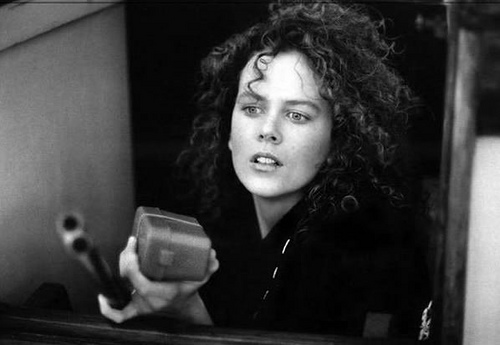

Dead Calm
1989
Directed by Philip Noyce
Based on the novel of the same name by Charles Williams
Screenplay by Terry Hayes
Edited by Richard Francis-Bruce
Music by Graeme Revell
While the film being reviewed is Dead Calm, I’m also including some info on Orson Welles’ unfinished (and unreleased) film The Deep, both films based on the 1963 novel by Charles Williams.
Dead Calm, starring Sam Neill, Nicole Kidman (in her breakthrough role), and Billy Zane is essentially about a couple who, after the death of their young son, go on holiday to cope. Neill’s character (John) is a well-respected (and one assumes, rather high-ranking) Australian naval officer who arrives home on leave only to discover that his son is dead and his wife is very affected by the incident. They sail their yacht far out into the ocean where the water is tranquil and the sun is bright.
Shortly into the film, a man (Zane playing the role of Hughie) is seen rowing towards the couple’s yacht. Once on board he explains that all of his crew have died of food poisoning and that his ship is sinking. John rows back to Hughie’s ship to inspect the damage, leaving his wife alone with a man who’s story seems … unlikely.
So as to avoid any major spoilers, I’ll leave the story there, but it becomes rather predictable from that point on. The film does contain a perfect complimentary soundtrack that heightens the tension effectively, especially during the early scenes involving the car accident.
Noyce does a respectable job of adapting the novel to the screen, but the best moments in the film are the first half hour and the scenes involving Neill and the leaking ship. The film falters a bit in the scenes with Zane and Kidman because it’s treated so heavy-handedly and then eventually culminating into a strange twist that would probably offend those put-off by Peckinpah’s Straw Dogs. The ending is very predictable and rather shabbily handled I must say, in particular when Zane makes his final appearance with his dirty hands shampooing Kidman’s hair. It’s all done in a way that seems to aspire to the Hollywood aesthetic of filmmaking (which is exactly what Welles’ was shooting for in his film – though one surmises that he would’ve handled it differently in terms of tone), and it really suffers because of that. At the end, the characters seem to act as if nothing unusual occurred at all, fantasizing about hot baths and warm meals.
So, to sum up, Dead Calm does a serviceable job of adapting Williams’ novel with a wonderful initial half hour and intermittent moments of brilliance (the climatic scene involving the destruction of a ship is handled well), but despite some reasonably solid acting the film descends into typical Hollywood fare. Perhaps that last phrase is overly harsh because this really is a pretty good film, if a bit misguided at times.
Overall rating: * * * (Three stars out of six)
The Deep
1966-1969 (unfinished)
The Deep is one of the many unfinished films in Wellesian mythology. As is characteristic of Welles’ film projects, The Deep underwent a very challenging development (from 1966-1969) with Welles having to fund the film himself, and only being able to work on the film between other, more lucrative projects. Welles himself plays the role of Russ Brewer, the shipwrecked man who seeks shelter in the boat of the honeymooning couple.
Little is officially known about Welles’ version since the original negative was lost and, most tragically, entire scenes were not shot because of the death of the lead actor, Laurence Harvey (including the climatic final scenes). Welles did attempt to salvage the footage he already had, but was unable to completely do so. Only a “working version” exists (consisting of roughly recorded dialogue and no music), but there are rumours of a version of the film being released (though I have my doubts). There is some footage that can be seen in the documentary One-Man Band as well.




No comments:
Post a Comment